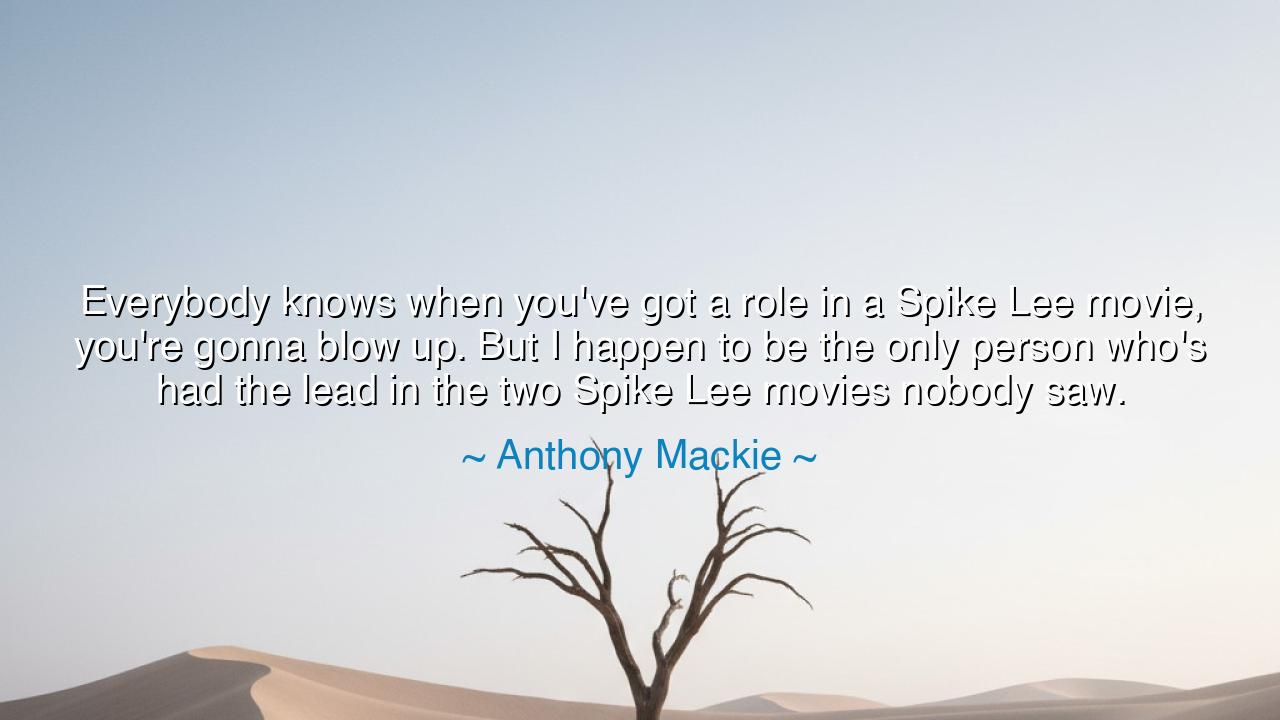
Everybody knows when you've got a role in a Spike Lee movie
Everybody knows when you've got a role in a Spike Lee movie, you're gonna blow up. But I happen to be the only person who's had the lead in the two Spike Lee movies nobody saw.






Listen, O Seekers of Wisdom, to the words of Anthony Mackie, who speaks of the unpredictability and complexity of fame in the world of cinema: "Everybody knows when you've got a role in a Spike Lee movie, you're gonna blow up. But I happen to be the only person who's had the lead in the two Spike Lee movies nobody saw." In these words, Mackie offers a profound reflection on the nature of success, the uncertainty that accompanies fame, and the ways in which expectations and outcomes are often not aligned. The truth of his statement resonates with the human condition, reminding us that greatness is not always accompanied by immediate recognition or commercial success.
In the ancient world, there was no greater hero than the tragic figure—those who sought greatness only to meet with misfortune or failure. Consider the Greek tragedies, where heroes like Oedipus or Antigone were marked by fate’s cruel twists. Though they sought truth, honor, and glory, their paths were often obscured by forces beyond their control. These ancient tales remind us that the journey toward greatness is not always smooth, and that external recognition often eludes those who seek it the most. Just as Mackie reflects on his roles in Spike Lee’s films, where he was primed for success but found himself in projects that went unseen, so too do the ancient heroes find themselves caught in webs of fate, where their intentions and their actions do not always lead to the outcome they desired.
In Mackie’s experience, we see the tension between ambition and reality. In the world of cinema, much like in the ancient world, the road to fame is often unpredictable, fraught with obstacles that may seem arbitrary. The ancient heroes were not only challenged by the gods, but often by the very societies they tried to save or lead. Think of Achilles, whose greatness on the battlefield could not protect him from the fateful arrow that struck his heel, the one weak point in his otherwise invincible form. Similarly, Mackie found himself in roles with immense potential, only to face the unforeseen reality that success does not always follow talent or opportunity. It is a lesson in humility—sometimes, even the most brilliant opportunities are not destined for the spotlight.
This, O Seekers, is where the true test of character lies: not in the outcome of one’s efforts, but in the resolve to continue despite the lack of recognition. Like the great philosophers who faced misunderstanding in their lifetimes, yet whose teachings outlasted them by centuries, Mackie’s story is one of perseverance in the face of uncertainty. Consider the life of Socrates, whose ideas were often ridiculed during his time, yet who became one of the most influential figures in Western thought. Socrates was not measured by the immediate acclaim he received but by the depth and truth of his contributions. In much the same way, Mackie’s roles in Spike Lee’s films, though not met with the expected commercial success, may carry significance far beyond what is immediately seen or understood.
In the grander narrative of life, O Seekers, Mackie’s experience teaches us that the measure of one’s worth is not determined by the applause or recognition of the world, but by the integrity and commitment with which we approach our craft. Mackie, as an actor, embraced roles that allowed him to challenge himself, to explore the complexities of his craft, and to step into stories that required courage and vulnerability. His willingness to take on roles that others may have overlooked shows the heroism in quiet persistence—in doing the work without the guarantee of immediate reward or recognition.
Let this, O Seekers, be the lesson: greatness does not always come with fame, and recognition does not always align with effort. The true reward lies in the dedication to one’s purpose and the bravery to continue even when the world does not see or understand. Like Mackie, who found meaning in his roles despite the lack of recognition, we too must learn to value the process over the outcome. The heroes of ancient myth did not always live to see their glory; their greatness was often revealed in their actions, not in the recognition they received.
Thus, O Children of the Future, remember this: the road to fulfillment is often uncertain, and the results of our efforts may not always align with our expectations. Yet, in the face of adversity, in the absence of immediate recognition, we must continue to pursue our passions and purpose with integrity. Like Mackie, let us learn to embrace the journey for what it teaches us, knowing that true success is not found in the external accolades, but in the internal growth and the courage to persevere. For it is through the struggle, not the applause, that the greatest victories are achieved.






AAdministratorAdministrator
Welcome, honored guests. Please leave a comment, we will respond soon